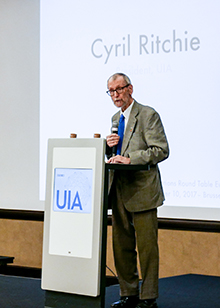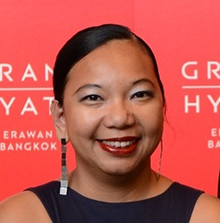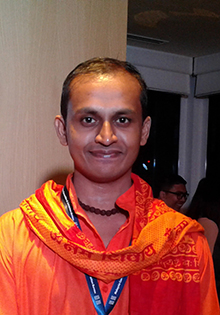Speakers

Cyril Ritchie
President of UIA
"Association values versus Realpolitik: walking a fine line"
Governments are "in business" (theoretically in certain cases) to provide essential social and infrastructural services to their populations, and to ensure sound and fair administration, safety, security, order and justice. Inter alia.
Many associations (NGOs, CSOs, CBOs, PVOs etc) are "in business" to provide non-profit social services: to expose mal-administration and corruption; to track violations and violators of human rights and social rights; to combat patriarchal systems denying justice to women. Inter alia.
What are the boundaries between these sometimes competing, sometimes complementary interests and policies? Who may, who should, determine priorities? Are laws always just, always applicable, always applied?
This session will explore some fine lines separating (or joining?) governmental and non-governmental concerns.
Biography
President of UIA – Union of International Associations (since 2017)
First Vice-President of CoNGO – Conference of Non-Governmental Organizations in Consultative Relationship with the United Nations (since 2018), formerly President (2011-2018)
Honorary President of the Council of Europe Expert Council on NGO Law (since 2018), formerly President (2008-2018)
Senior Policy Advisor of WFC – World Future Council (since 2012)
Chair of ELCI – Environment Liaison Centre International (since 2000)
Titular of the World Order of the Smile (since 1979)
President of ICSFD – International Civil Society Forum for Democracy (2006)
Chair of WOCSOC – World Conference on Civil Society (1999)
Executive Director of ICVA – International Council of Voluntary Agencies (1964-1978 and 1990-1991)

Jack Sim
Founder, World Toilet Organization (WTO)
Why are people important to civil society?
Biography
Jack Sim, Founder of World Toilet Organization (WTO), has been a successful businessman since age 24. Having achieved financial success in his 40s, Jack felt the need to change his direction in life and give back to humanity – he wanted to live his life according to the motto “Live a useful life”. Jack soon left his business and embarked on a journey that saw him being the voice for those who cannot speak out and fighting for the dignity, rights and health for the vulnerable and poor worldwide.
Jack discovered that toilets were often neglected and grew concerned that the topic was often shrouded in embarrassment and apathy; talking toilets was taboo! Jack felt this led to the neglect of restrooms island wide. In 1998, he established the Restroom Association of Singapore (RAS) whose mission was to raise the standards of public toilets in Singapore and around the world.
Through RAS, Jack’s vision was to put Singapore on the “world map” by taking the initiative to provide clean public toilets. As Jack began his work in Singapore, he realized there were other existing toilet associations operating in other countries.
It soon became clear that there were no channels available to bring these organisations together to share information, resources and facilitate change. There was a lack of synergy. As a result, in 2001, Jack founded the World Toilet Organization (WTO) and four years later, the World Toilet College (WTC) in 2005. In 2004, Jack was awarded the Singapore Green Plan Award 2012 by Singapore’s National Environment Agency (NEA) for his contribution to Environment. In 2006, Jack was invited to launch The German Toilet Organisation in Berlin. He is also a founding member of American Restroom Association.
In 2007, Jack became one of the key members to convene the Sustainable Sanitation Alliance (SuSanA) comprised of over 130 organisations active in the sanitation sector. Jack is also an Ashoka Global Fellow and in 2008 was named Hero of the Environment by Time Magazine. Jack also sits in the World Economic Forum’s Global Agenda Councils (GAC) for Water Security and also the GAC for Social Entrepreneurship.
He graduated with a Masters in Public Administration from the Lee Kuan Yew School of Public Policy in 2013. He was shortlisted for the Sarphati Sanitation Award in November 2013.

Hemant K. Batra
Vice President, SAARCLAW - South Asian Association for Regional Co-Operation
Founder & Chairman, Kaden Boriss Legal
Co-Founder & Senior Fellow, Goeman Bind HTO
Association governance: a way of life, not a set of rules
Governance is often erroneously seen as a burden of compliances rather than as a worthy habit. As management techniques evolve, many association and organization governors (founders, board members, managers) are discovering that overall success lies in good governance, and good governance should be seen as a way of life – ethical and sustainable – and not as an obligation or constraint. Governance comprises the three balancing wheels, ART: accountability, responsibility and transparency. In this case study we will consider how to manage an association successfully on these three wheels.
Biography
Hemant is a strategist business, corporate, commercial, and policy lawyer, with a law and policy practice across the globe, and specifically in India, for nearly three decades. He is the founder of Kaden Boriss, a network of a global corporate, commercial, and business law practitioner firms.
He writes and speaks on current topics of importance, including legal, policy, social and economic issues. He is an acclaimed writer of seven books on diverse topics. His latest, on due diligence in business and asset acquisition, was published by leading law publisher Eastern Book Company.
He was awarded the prestigious Mahatma Gandhi Seva Medal by the Gandhi Global Foundation for effectively connecting the legal communities of the SAARC nations. With ten years of service, he was the longest serving Secretary-General of SAARCLAW - South Asian Association for Regional cooperation in Law, and is now the elected Vice-President. He is associated with various projects of UN, UNDP, UNAIDS, UNESCAP, and ADB, and is Chair of the South Asia Committee of the Indian National Bar Association.
He has been a visiting guest speaker at various international universities and institutions. Up to 2018, he has been an invited speaker at more than 300 international conferences, seminars, and workshops on various topics.
He travels extensively. Under the brand Urf Hekbat he is a noted music composer and producer.

Jan Tonkin
Immediate Past-President, IAPCO (International Association of Professional Congress Organisers)
Managing Director, The Conference Company
Professional Conference Organisers (PCOs) – bringing your vision for your conference to life
Helping your Association realise your vision for your conference or event is at the heart of a Professional Conference Organiser’s service. Working alongside your Committee or project team they ensure everything is planned to the last detail and they take the stress out of every step of the organising and the ‘on the day’ delivery.
From project planning, financial management, marketing, mitigating risks, securing sponsors and exhibitors, booking venues and co-ordinating a myriad of suppliers through to registering delegates, communicating with speakers, booking accommodation, managing abstract submissions, creating memorable social occasions and onsite management, PCOs do it all.
This session will cover how a PCO’s role complements an Association’s and how they add value to your event and your Association. We will talk about the cost and benefits of using a PCO and work through how to call for proposals and engage a PCO.
Biography
Jan has worked in the meetings business all her professional life, both in the UK and New Zealand. She founded The Conference Company in 1990 and today is the hands-on managing director of the busy company which has three offices in New Zealand and one in Sydney, Australia. Her team organises meetings of all shapes and sizes throughout Australasia and Asia, with particular expertise in association conferences and their exhibitions, government meetings and awards programmes.
Her other hat is that of educator and leader in the international meetings world. She has recently finished a two-year term as President of IAPCO, the International Association of Professional Congress Organisers and is the Chair of the Association’s Training Academy. Jan helped design and launch the IAPCO EDGE series of regional seminars which have been very well received in a number of corners of the globe. She has been a regular presenter at IAPCO seminars throughout Asia, participated in seminars at industry events in Europe, Africa, Australia and the USA and been a moderator and speaker at PCMA’s (Professional Convention Management Association) Convening Leaders Conference.

Barbara Ewals
Director for Partnerships, International Society of Geriatric Oncology (SIOG)
Contributing to the United Nations Sustainable Development Goals
The SDGs cover broad challenges such as economic inclusion, diminishing natural resources, geopolitical instability, environmental degradation and the multifaceted impacts of climate change. They define the agenda for inclusive economic growth through to 2030 and were developed with inputs from business, academia and nonprofit organizations globally.
Many organizations have also been working to address environmental, social and economic issues. Many have begun to recognize that they can only address these complex sustainability challenges by scaling up their efforts through collaboration with peers, industry and sector organizations, customers, governments, nonprofit organizations, and society. The SDGs provide a universal and visionary framework for this global cooperation and action, bringing all stakeholders together to proactively address and solve these challenges.
If the SDGs are to be met, everyone will need to play a major role and associations can and should contribute to this.
Biography
Barbara Ewals is the current Director for Partnerships at the International Society of Geriatric Oncology (SIOG), headquartered in Geneva, Switzerland. She facilitates the engagement and establishment of partnerships for SIOG with leading public, private and international development organizations. She has extensive global experience spanning 15 years as a corporate engagement expert in various industries.
Prior to joining SIOG – she was also the Director of Partnerships at the Council on Health Research for Development (COHRED) which is also based in Geneva as well as the Stakeholder Engagement Director for Global Initiatives (a sustainability consultancy based in Singapore). She held various positions in organizations based in Thailand, Singapore, Geneva and the Philippines.
She holds the degree from the University of the Philippines (Diliman) and is a member of various professional associations such as the Association of Fundraising Professionals (AFP), International Congress and Convention Association (ICCA) and the International Association of Events and Exhibitions (IAEE).

Guruji Murugan Chillayah
Founder and Chairman of Silambam Asia
Digital tools for an illiterate audience
Silambam works with a largely illiterate audience, including helping them access and use digital tools. With illiteracy a worldwide problem - according to 2017 data from the UNESCO Institute for Statistics, there are still 750 million illiterate adults; digital illiteracy is even more widespread - in this case study we will look at best and worst practices, drawing on personal experience and trying some live tests.
Biography
Guruji Murugan Chillayah is Founder and Chairman of Silambam Asia (an NGO with, since 2019, Special Consultative Status at ECOSOC), the World Silambam Association and the World Yoga Association.
Guruji was born in Seremban in Negeri Sembilan state in Malaysia. Since childhood he has been active and promising in academics, arts and sports. At the age of 18 he began his pilgrimage, a journey of experience in modern and traditional life, leading to a path of spirituality. Since 1989, Guruji is a respected practitioner and teacher of Silambam, traditional yoga, and Varma Kalai (Varma Vidya).
He studied International Business Management in Singapore and joined Singapore Telecommunication (SingTel) in Corporate and Consumer Relations, leading a contigency team to resolve national level critical issues in Media Content Transmission and UAT (copper and fiber-optics). He received Outstanding Performance Awards before moving on in 2010 to the pathway of monasticism.
He was initiated into the Sannyasa order in Omkarananda Rishikesh, in the Himalaya region of India. He taught practial skills in the rural communities around Uttarakhand, earning the nickname "Kartigeya" (Son of Shiva). He returned to Malaysia in 2016 and since then has initiated and led the work of Silambam, traditional yoga and Varma Kalai, setting new standards for collaborative work for Silambam practitioners worldwide.

Amelia Folkema
Communications Officer, Union of International Associations
The Association of “What now!?”
The non-profit world is vast and diverse. It can be a challenge for an association to stand out and accurately and concisely convey the unique added value it brings to society. What can the non-profit sector learn from strategies more commonly employed in the commercial world? How do you build brand awareness for your organization? Which tools provide the best return on investment? How do you ensure your organization never again has to deal with the question “The association of what now?”?
Biography
Amelia Folkema has been involved with UIA for over a decade. She started out working as a student on editorial projects. It was this early exposure to the world of international associations which was a driving factor in her desire to pursue the field of communications. While obtaining her master’s in public relations at the Dublin Institute of Technology, Amelia did freelance social media and press relations work for the UIA. After completing her dissertation on cross-cultural crisis communication, she moved back to Belgium to become UIA’s Communications Officer.